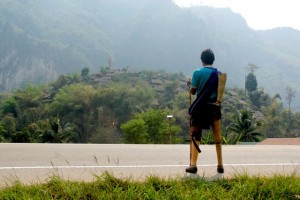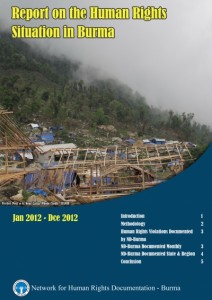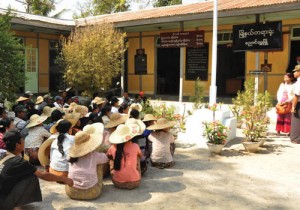Posts Tagged ‘Shan State’ (197 found)
Thein Sein Government Must be Held Accountable for Fresh Burma Army Atrocities in Shan State
The Shan Human Rights Foundation is gravely concerned at fresh widespread atrocities by the Burma Army against civilians in Tangy an, northern Shan State, and is calling on the international community to hold the Burmese government accountable for these abuses […]
• • •More Armed Conflict, More Landmines
 Last Thursday, 4 April, was International Day of Mine Awareness. While over 80% of the world’s countries have signed or agreed to the 1997 Ottawa Convention banning the use of landmines, Burma is among the 20% who have not. Recent statistics place Burma as the country with the third largest amount of land mine causalities in the world. From 1999 to 2011, over 3,000 men, women and children have lost their lives to mines in Burma. A week and a half ago, two porters, forcibly conscripted by the Burma Army, were killed in Northern Shan State by landmines.
Last Thursday, 4 April, was International Day of Mine Awareness. While over 80% of the world’s countries have signed or agreed to the 1997 Ottawa Convention banning the use of landmines, Burma is among the 20% who have not. Recent statistics place Burma as the country with the third largest amount of land mine causalities in the world. From 1999 to 2011, over 3,000 men, women and children have lost their lives to mines in Burma. A week and a half ago, two porters, forcibly conscripted by the Burma Army, were killed in Northern Shan State by landmines.
Mines are regularly used by both government forces and non-state armed groups. Parts of Northern and Eastern Burma have some of the highest concentration of mines in the world. The Land Mine and Cluster Munitions Monitor identifies over 47 townships in Kachin, Karen, Karenni, Mon, Arakan and Shan States that suffer from mine contamination as well as in Pegu and Tenasserim Regions […]
Northern Shan Farmers Call for Chinese Pipelines to be Removed from their Lands
Northern Shan farmers are submitting demands to Burma’s government today for China’s giant oil and gas pipelines to be removed from their lands immediately, citing rights abuses, poor construction and safety fears.
Representatives of the 10,000 strong Northern Shan Farmers’ Committee are today delivering their demands to the Shan State Parliament in Taunggyi, urging the removal of the trans-Burma pipelines before they become operational next month […]
• • •Urgent Update on Human Rights Situation in Northern Shan State
Over 1,000 flee Burma Army abuses in new operations against Shan State Army-North
Atrocities by Burmese troops in a new military operation against the Shan State Army North (SSA-N) have caused over 1,000 villagers, from 16 villages in Tangyan, to flee from their homes during the past two weeks […]
• • •Report on the Human Rights Situation (January – December 2012)
 The annual report of Network for Human Rights Documentation – Burma (ND-Burma) documented the human rights situation in Burma from December 2011-January 2013. The report provides information on human rights violations (HRVs) over this period and highlights pressing issues and trends taking place in Burma. The annual report covers human rights violations in 16 categories over all 14 states. Unsurprisingly, the highest incidences of abuse occurred in ethnic nationality areas that remain in open conflict with the Burma Army, the Tatmawdaw, or are the grounds for controversial development projects […]
The annual report of Network for Human Rights Documentation – Burma (ND-Burma) documented the human rights situation in Burma from December 2011-January 2013. The report provides information on human rights violations (HRVs) over this period and highlights pressing issues and trends taking place in Burma. The annual report covers human rights violations in 16 categories over all 14 states. Unsurprisingly, the highest incidences of abuse occurred in ethnic nationality areas that remain in open conflict with the Burma Army, the Tatmawdaw, or are the grounds for controversial development projects […]
Seven Charged Over Inle Lake Hotel Zone Protest
 Villagers who say the government confiscated their land to build a hotel complex in Nyaungshwe township, Shan State, have been charged with obstruction following a protest demonstration. If convicted, they face up to six months in prison or a fine.
Villagers who say the government confiscated their land to build a hotel complex in Nyaungshwe township, Shan State, have been charged with obstruction following a protest demonstration. If convicted, they face up to six months in prison or a fine.
Seven local residents face charges in Nyaungshwe township, near Taunggyi and the major tourist destination of Inle Lake, where land is being cleared for the hotel zone. They are U Zaw Min, U Thein Tun Oo, Daw Khin Win, U Kyaw Sein, U Aung Myint, U Chway Gal and U Aung Kyaw Myo from Inngyinkon and Kanbe villages. Nyaungshwe township administrator U Soe Win Maung accused them of incitement to impede administrative tasks […]
Communities Across Shan State Vent Frustration at Ongoing Abuses During Peace Process
Communities attending recent public meetings across Shan State vented frustration at ongoing abuses despite the fact that the new peace process has been underway for over a year […]
• • •Eight-Point Union-Level Agreement with the Pa-O National Liberation Organization
The Union Peace-Making Work Committee and peace representatives from the PNLO held Union level peace talks and signed the Union level eight-point agreement as follows […]
• •Five-Point State-Level Agreement with the Pa-O National Liberation Organization
The state level peace-making group and the Pa-O National Liberation Organization signed an agreement with the following five points […]
• •Joint Statement on Current Political Situation and Peace Processes
On June 4 and 5, 2012, about 80 people from various community-based organizations, including women’s, youth, environment, community development, media, health, education, literature and culture groups, migrant workers groups, as well as monks and farmers from Shan State held a forum to discuss the current political situation in Shan State, especially the ongoing peace negotiation process […]
• • •








 All posts
All posts